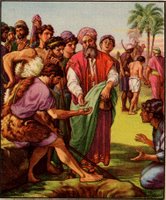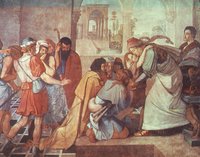Reading & Hearing the Word of God
Luke 4:14-21
INTRODUCTION
When Ezra returned from Babylon he was carrying under his arm the only surviving copy of the Holy Scriptures. As he stood on a high platform before the congregation of the people, he opened the book. And all the people stood up. As he began to read the words, the people wept. Clearly, this was an important event in the lives of the returning exiles. Every day, Ezra would climb the platform and begin reading from early morning until Noon. Amazingly, the ears of all the people were attentive to the reading of God’s word. How unlike us today. We get bored if the preacher’s text is more than just a few verses.
From his youth, Jesus went to the synagogue in Nazareth with Joseph. He heard the reading of the scriptures on every Sabbath. He had no personal copy of the scriptures. Such things cost a great deal in His day. They had no printing press.
Each copy had to be painstakingly copied by hand. And yet, by the time he reached manhood he had heard every verse of scripture read at least five times through the lectio divina of the local synagogue. Jesus listened attentively, savoring each word as it was read by the rabbi.
It was no haphazard selection of scripture that Jesus read that day in the synagogue in Nazareth.
The Bible has come down to us through many centuries. For most of that time it was the world’s best seller. Most homes today have at least one copy. Christian homes may have many copies and many different translations. But what is this book we call the Bible? We believe it to be the Word of God. But what do we mean by that? How did God give this Word to us? Who wrote it? How did it get to be so important?
The Bible is the witness of the people of Israel to the hand of God at work in their lives. It is that. But it is much more.
GIVING AND RECEIVING THE WORD OF GOD
God gave the Law to Moses on Sinai. In the midst of the fiery, thunderous and cloud enveloped mountain, Moses, face to face in God’s presence, received God’s words and carefully memorized them. What he wrote down on stone tablets were only ten words, the Decalogue, the Ten Commandments. Yet tradition attributes the entire Torah or the first five books of the Bible to his authorship. Much of what Moses received during those forty days on the mountain was retained in his memory and reinforced by God over his life time by continual visits from God. But if he wrote the words down, the Bible is silent about it. No copy bearing Moses’ signature has been found to this day. Instead, the Israelites preserved their scriptures by handing them down by word of mouth to their children.
In time men and women would set the words down in writing. Many men and women would be involved in the writing and the copying of the scriptures. They were copied over and over many times during the history of Israel. At some point during the divided monarchy, the reading of the scriptures was suspended and the scriptures became neglected and eventually lost. One of my favorite Old Testament stories is set in the reign of the young king Josiah. The priest Hilkiah was cleaning out the Temple, which also had fallen into disuse, and he found a copy of a book. The book turned out to be the lost scriptures, either in whole or in part.
Then the Babylonians conquered Jerusalem, destroyed the temple and carried the ruling class, including the priests, away to a little suburb of Babylon called Tel Aviv. The scriptures were again thought to be lost. Seventy years, two generations, went by with no reading of the Holy Scriptures. When the exiles returned to Jerusalem to rebuild the walls of the city and the Temple, they returned without their scriptures. They tried to maintain Temple worship from what the little the old people of the previous generation could remember. But even they were only children at the last reading of the scripture in the Temple.
Then came Ezra the Scribe.
Ezra had been a scribe in Jerusalem before the exile. Among the belongings he quickly gathered when the soldiers came to escort him to Babylon, was a copy of the Holy Scriptures. He treasured them and protected them. He copied them on to fresh paper. Some believe that he also edited them by smoothing out rough places and blending the writing of many authors. When Ezra returned he immediately told Nehemiah, the governor appointed by the Persians to rebuild the city walls. And Nehemiah realized that this was what his people needed to revitalize them and renew their spirit for building.
READING AND HEARING AS INSTRUCTION
Ezra read the scriptures every day and the Levites interpreted them to the people for the purpose of instruction in the ways of the Lord. The reason the scriptures need to be interpreted was that they were written in Hebrew. After two generations in captivity, the people could only speak Aramaic, the language of the Persians.
When Alexander the Great conquered the known world he also spread the Greek culture across the world. In Alexandria in Egypt, several Jewish scholars translated the Hebrew scriptures into Greek. By New Testament Times, the available scriptures were this Greek translation call the Septuagint. The New Testament writers wrote their books in Greek. The common man could not understand Hebrew or Greek. Only the very rich and the priests in the church were given instruction in such languages. In the 5th century, a Roman scholar by the name of Jerome translated the Hebrew and Greek scriptures into Latin, which at that time was the language of the common people, hence the name the Latin Vulgate, vulgate meaning common.
But civilization spread into new territories that spoke different languages from Latin. Eventually Latin itself ceased to be used. There were French, Italians, Swiss, Germans, Austrians, Normans and Anglo-Saxons. Once again the common people were without a bible that they could read.
In 1611 King James of England issued a decree that the Holy Scriptures should be translated into English. For four hundred years we have had a translation of the Bible in a language we can read and understand. In the last fifty years, there has been a proliferation of translations intended to make the Bible more easily understood.
When Jesus opened the scroll of Isaiah and read from Chapter 61, it was for the instruction of the Jews in his hometown.
An aging Paul told young Timothy, “All scripture is inspired by God and is useful for teaching, for reproof, for correction, and for training in righteousness, so that everyone who belongs to God may be proficient, equipped for every good work.
One of the ways we should read the scriptures is for instruction and for understanding.
READING AND HEARING AS WORSHIP
Another way of experiencing God’s Word is by reading and hearing the Word of God as an act of worship. You will notice that our Morning Worship is centered around the reading and the hearing of the scriptures. That is not the case in most Protestant, evangelical churches today. In many churches the scripture reading is short and used only as an introduction to the pastor’s sermon.
When Ezra opened the book, all the people stood up (an act of worship.) When Ezra gave thanks to God for the giving of the book, all the people shouted “Amen, Amen” (an act of worship.) Then all the people bowed down with their faces toward the ground and worshipped the Lord. In this religious ceremony recorded in the book of Nehemiah the reading and the hearing of the scripture is the focal point of the worship. Ezra simply read the scriptures and all the people listened.
WE MUST HAVE READERS
To experience the Bible for both understanding and for worship, we must have men and women who are willing to take up the Bible and read. It is important to read the scriptures at least every day. We should read the scriptures in our private devotions, of course, but we should also read the scriptures aloud to each other. Mothers and Fathers reading to their children. Children as they begin to read can begin to participate by reading their favorite scripture. I am convinced that families that read the scripture together and pray on a daily basis are more loving and more intimate.
WE MUST HAVE HEARERS
We must have men and women who come to the Word with open minds and open hearts. People who are searching for God. Jesus often said, “he who has ears to hear, let him hear.” If we are to hear the message that Jesus has for us we must prepare our ears, our minds and our hearts to receive the message He is sending to us. Preparation to hear the Word of God is made by prayer and by maintaining a prayerful attitude during the reading of scripture. God speaks to us through the age old scriptures but what He says to us is fresh and new and uniquely applied for each seeker.
You cannot properly hear Christ’s message until you have given your life to Him. He doesn’t want a part of your life. He wants you, totally, completely and unreservedly. Remember that Jesus said, “I am come that they might have life, and that they might have it more abundantly.” [John 10:10] When you give your life totally, completely and unreservedly to Jesus Christ, He gives it back to you more abundantly than before.





